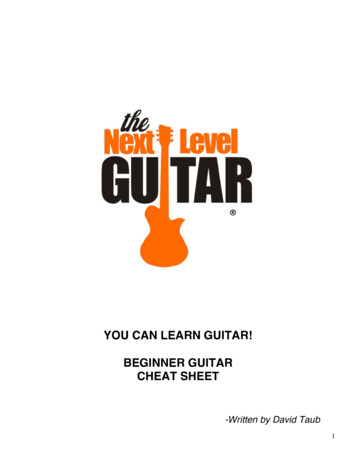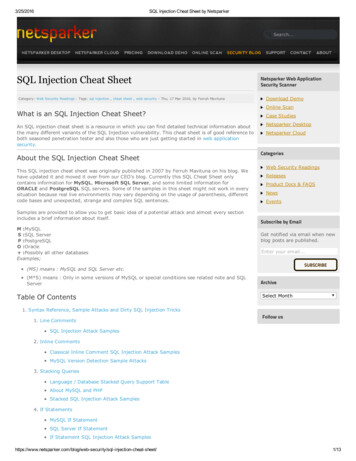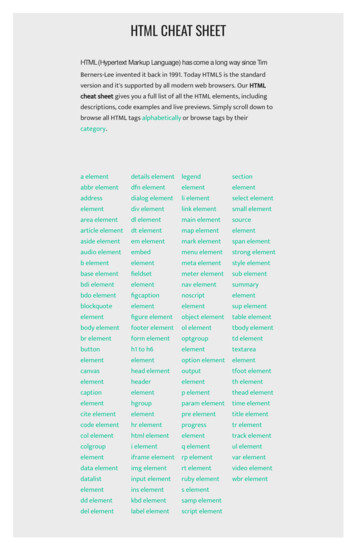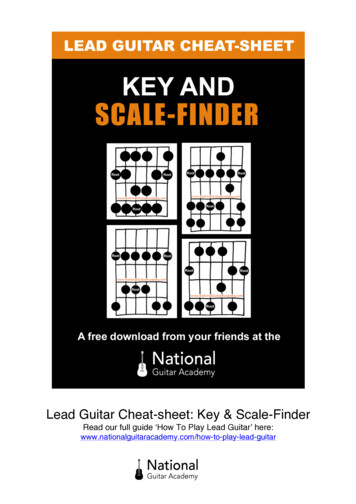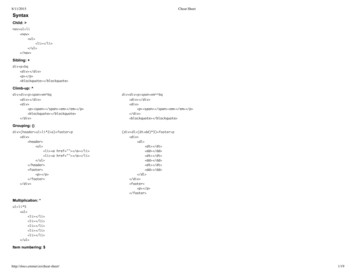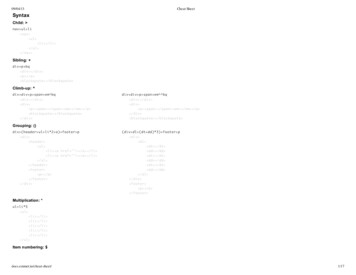
Transcription
Cheat Sheet: 5 Ways to Invest in Real Estate with (Almost) No Money DownIntroduction: Get Your Financial House in OrderIs it true, that it takes money to make money?Sort of.We’re going to go over some techniques and tricks that you can use to buy real estate withoutvery deep pockets. And they work, as a way to get you started.But you still need a foundation of strong personal finance habits and discipline. Without these,no one can keep their wealth even if they briefly score some. After all, most lottery winners gobroke within a few years – because they don’t have the habits needed for financial success.Start setting aside a certain portion of your paycheck, as an automated transfer that happens onthe same day you get paid. The higher the savings cutout, the faster you’ll be able to invest andbuild wealth, so aim to put aside 10-30% of your take-home paycheck every two weeks.2
Cheat Sheet: 5 Ways to Invest in Real Estate with (Almost) No Money DownAs a property owner, you’ll be hit with all kinds of unexpected costs: vacancies, repair bills,tenant defaults. You’ll need a cash cushion, and the more investment properties you own, thehigher it needs to be.We’re not your parents, we’ll lay off the lecture and cut to the chase, but it’s absolutely, 100%necessary that you start setting aside money every two weeks if you want to build lasting wealth.Suggested Read: 10 Surprising Ways Your Subconscious Is Keeping You PoorTechnique 1: Buy a Duplex, Triplex or Fourplex& Move InFun fact: FHA mortgages allow owner-occupied financing for buildings with up to four units. Thatmeans you can get a cheap, “normal” mortgage, with little money down, for up to three rentalunits plus a new home for yourself.Credit: Your credit matters, of course, with an FHA mortgage. The better your credit, the less moneythey’ll ask you to come up with for a down payment.LTV: The maximum loan-to-value ratio that FHA loans allow is 96.5%. That means a minimum downpayment of 3.5%.Mortgage Insurance: If your down payment is less than 20%, be prepared to pay mortgage insuranceevery month! See the FHA’s loan calculator for exact monthly costs.Rental Income: You can count 75% of the rents from the other units toward your income, for qualifyingfor the loan. But Warning: If you buy a triplex or a fourplex, the projected rents from the building must be able to coverthe mortgage payment (including principal, interest, taxes and insurance).Pro Tip: Negotiate a seller concession, so that the seller covers your closing costs at the table. FHA allows aseller concession of up to 6% of the purchase price!3
Cheat Sheet: 5 Ways to Invest in Real Estate with (Almost) No Money DownTechnique 2: Find a Senior PartnerW ho says you need to go it alone? For their first few deals, new investors should be partneringwith an experienced partner regardless, because they’ll show you so many shortcuts.Benefits of Teaming with a Senior Partner:Discover local investment property lendersGain contacts among contractors, realtors, appraisers, home inspectors, etc.Avoid expensive mistakesLEARN!Drawbacks: You’ll be the gopher, doing all the grunt work, and you’ll make a much smaller portion ofprofit. Understand that you need to bring something to the table here. If you’re not bringingexperience, and you’re not bringing much money, then you’ll have to bring labor and hustle.Where to Find a Senior Partner: Local real estate investing associations (AKA real estate investing clubs). Want a directory ofthem? Email us and we’ll email you a nationwide directory that we don’t publish on our website.Local informal real estate investing Meetup GroupsFacebook groups for local real estate investorsBiggerPockets online communityNetwork! Someone that you know will already know an experienced real estate investorWord to the Wise: Your senior partner may expect you to collaborate with them on a certain number ofdeals, because in your first couple deals you’ll be more hindrance than help to them. But at a certainpoint, you’ll gain enough skill to start bringing real value to the table.Family & Friends: You can partner with family or friends, to ease the cost burden or to qualify for a loan,but one of you should have real estate investing experience. Remember the cliché about the blindleading the blind.Technique 3: Cross-Collateralize Your HomeOwn a home with some equity? Before going through the hassle of refinancing or gettinga HELOC, consider offering your home as a second piece of collateral to the bank.4
Cheat Sheet: 5 Ways to Invest in Real Estate with (Almost) No Money DownDitch the Down Payment: Instead of making you bring a 20% down payment to the table, thebank protects itself by putting a second lien on your home, and gives you full 100% financing.Willing Lenders: Many conventional loan programs won’t allow this. But hard money lenders areusually open to this idea, and some community banks allow it as well.HELOC over Refi: Can’t find a good lender to cross-collateralize your home? You can always geta HELOC (home equity line of credit) to pull some quick money out of your home. Avoid arefinance or second mortgage – they’re expensive and inflexible (read more about why to avoidrefinancing). Even better, HELOCs are a rotating form of credit, so you can pay the balance downand then pull money out again later when you need it!Buyer Beware: If you add your home as collateral for your investment property loan, and thendefault, the lender may foreclose on your home, too.Expense: The only extra expense is the extra title work – the title company will need to do a fulltitle search on your home and place a second lien against at. They won’t do that for free, butthink costs in the hundreds, not the thousands.Technique 4: Move in for a Year, Then Rent ItOut!This is the oldest trick in the book. You find a good deal on a home that will make a greatrental property, you move into the property, and shortly afterward you move out andlease it to tenants.One Year Rule: Most mortgage lenders require you to live in the property for at least a yearbefore pulling the old switcheroo on them.Penalties for Premature Evacuation: If they find out you vacated and rented the property outwithin the first year, they’ll start sending you unhappy letters. They probably won’t foreclose,but they could call your loan.Benefits: As an owner-occupied mortgage loan, the rate will be lower and the loan-to-value ratio(LTV) will be higher. Forget the standard 20% down required for investment loans, you couldscore a 3-5% down-payment loan. There’s something to be said for the simplicity, too.Drawbacks: While an easy and affordable way to buy your first rental property or two, it’sinherently slow. And who wants to move every year?5
Cheat Sheet: 5 Ways to Invest in Real Estate with (Almost) No Money DownLast Word: It’s a cheap and simple tactic to nab that first income-producing property or two.Don’t count on it as a long-term strategy though.Technique 5: Borrow Money from YourRetirement Account“Borrow” is a funny word, since it’s your own money in the retirement account, but justbecause it’s yours doesn’t mean you can pull it out.Loan Limit: You can borrow up to about 50,000 from your 401(k).LTV: Most 401(k) administrators only allow you to borrow up to 50% of your total 401(k) balance.Quick & Easy: No credit report, no lengthy underwriting period, you just borrow the money fromyour 401(k) administrator and it comes out of your own account.Amortization: Usually the “loan” is amortized on a five-year loan schedule.Short-Term Pickpocketing: You can, without penalty, take out money from your retirementaccounts for up to 60 days. If you don’t pay it back, the IRS will come for your arm, leg andfirstborn child.Distribution Penalties: Did you pull out money unofficially, for more than 60 days? Distribution!Now you owe taxes on that money. And penalties. And late fees. Expect no mercy, for ye shallreceive none.Job Loss: Your 401(k) is set up through your employer. If you lose your job, you owe the moneyback, right away, when you’re least able to pay it.IRAs & Other Retirement Accounts: You can’t borrow against IRAs the same way you can from401(k)s. If you have an alternative to a 401(k), such as a 403(b), you can pull similar maneuvers.Pro Tip: If you have a self-directed IRA or 401(k), you can actually choose to invest in real estateinstead of securities, as your investment of choice. It gets complicated though, so talk to youraccountant before you talk to anyone else.6
Cheat Sheet: 5 Ways to Invest in Real Estate with (Almost) No Money DownOutroductionMost new real estate investors worry too much about the money and not enough abouteducation.The techniques outlined above are just a handful of ways to buy real estate withoutbringing much of your own money to the table. There are many others – to read up on a few,check out our series on Unconventional Financing for Rental Properties.But what’s more important is to develop an investing strategy, to learn from other experiencedinvestors, to become an expert on a specific real estate market. Understand CapEx and use ourrental property ROI calculator to, well, calculate potential ROI! With knowledge and expertise,you’ll figure out the money part of the equation.Email Denise at denise@sparkrental.com or Brian at brian@sparkrental.com to chat with usabout your investments. We love hearing from readers, and use the resources atSparkRental.com to make even faster progress on your rental investments!7
Cheat Sheet: 5 Ways to Invest in Real Estate with (Almost) No Money Down 7 Outroduction ost new real estate investors worry too much about the money and not enough about education. The techniques outlined above are just a handful of ways to buy real estate

